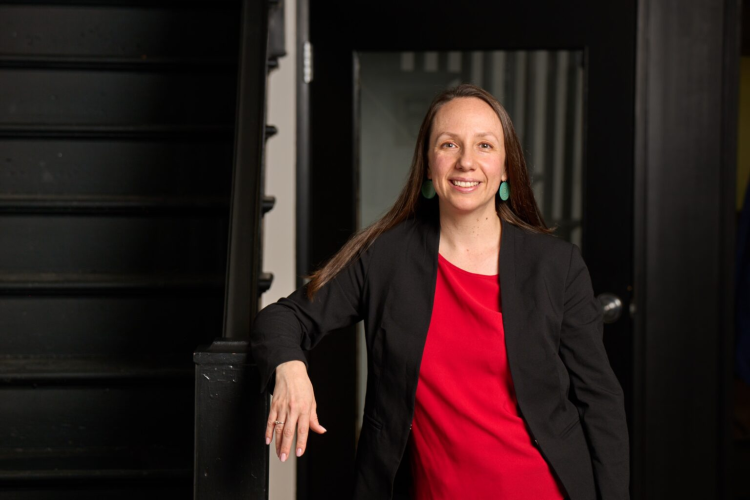NSCAD welcomes its newest Canada Research Chair (CRC), Dr. April Mandrona, who is now a CRC (Tier 2) in Art Education, Belonging and Social Change.
Mandrona, an Associate Professor in the Division of Art History and Contemporary Culture, Art Education, started at NSCAD in 2016. She holds a PhD in Art Education from Concordia University and was a SSHRC postdoctoral fellow in McGill University's Department of Integrated Studies in Education.
As a CRC, Mandrona's research will use art education approaches with young newcomers to Canada to re-imagine libraries as sites of community well-being, belonging and social inclusion.

Dr. April Mandrona teaches in NSCAD's Art Education program. Photo by Wiebke Schroeder.
'Trying to create spaces of belonging where difference is not erased but celebrated'
In developing the CRC program of research, Mandrona considered the increasingly key role of libraries in society. "How do we actually create responsive repositories of information, such as libraries, such as schools?" she asks. "This current CRC work is meant to look at the ways in which young newcomer people can contribute to places like libraries and the new narratives that can be held there."
Mandrona says libraries are taking on a growing importance today, performing many roles that are pivotal to the health of societies.
"Libraries are spaces where people who might have housing issues can go. They have teen-designated spaces. They have children's spaces. Libraries are amazing places for imagining possible futures of holding different types of knowledge," she says.
And yet, while they have increasingly taken on roles as agents for social inclusion for people like forced migrants, there are no in-depth and current studies on this Canadian reality that are grounded in art education.
"Fundamentally what this work is trying to do is help create those spaces of belonging where difference is not erased but celebrated."
Mandrona's 5-year research plan will include interrelated projects grounded in community-based art education: She will analyze media representations of newcomer young people, survey Nova Scotian library resources relevant to newcomer experiences; establish participatory, creative methodologies to support young newcomers in the making of their own art and narratives; design workshops led by newcomer young people for practitioners like librarians; and create a pilot library/maker space specific to newcomer young people's needs that is scalable for use in public libraries and community venues.
Storytelling, a vital method to work with young newcomers
Storytelling forms a long thread in Mandrona's research. The first grant she received at NSCAD focused on picture-book creation with newcomer children here in Halifax and in Coventry, England, where she did a visiting research fellowship at Conventry University's Centre for Trust, Peace and Social Relations.
"I think that really sparked something, this idea of working with young people to tell the stories that they want to tell, not the narratives that adults impose on their experiences."
In addition to her CRC research, Mandrona holds a SSHRC Partnership Development Grant that is taking storytelling in new directions. "The project is looking specifically at multimodal storytelling with newcomer young people, to support the generation of narratives that reflect the diverse creativity and perspectives of young newcomers," she explains.
A safe space 'where you can develop connections and relationships with other people'
Mandrona directs the Institute for Art, Community and Transdisciplinary Studies (InACTS) at 1871 Granville. "The Institute itself will become the test space for the building of our art education interventions into library spaces. It's an excellent gathering place. It's an idea place," she says.
The location of the InACTS as an accessible, street-level lab on the NSCAD Fountain campus is integral to the work of the CRC, she says. "One of the biggest issues, not just for young people but for anyone trying to do community work, is that there's such a need for space, a space that can be safe, a space where you will be welcome, where you might even feel like you belong, or where you can develop essential connections and relationships with other people."
NSCAD's approach to research is distinct within the cultural education sector in Canada as nearly all our research involves partnerships with communities, says Jana Macalik, Interim Vice-President Academic and Provost,
"April's chairship is a recognition of her hard work and the natural strengths of our university. We are very proud of her achievement. Her methods and scholarly approaches are uniquely positioned to meet some of the challenges that newcomers experience arriving in Nova Scotia. Through the Institute, she will continue to provide direct access from our campus to the many communities her research will serve."












